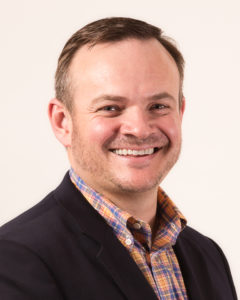
Jason Holley
City Manager
American Canyon, CA
What initially prompted you to get involved with local government?
I was unsatisfied working as a private engineering consultant in the mid-2000s and I aspired to be more impactful. I took advantage of an opening at City of Napa and was given the opportunity to lead several high-profile infrastructure projects—mostly related to flood control and transportation. Eventually, under the tutelage of former City Manager Mike Parness, I gained expertise in land development, emergency response and labor relations.
Why did you want to become a city manager?
I became a City Manager because I wanted to make a difference locally. I wanted to inspire and lead a team that I hand-crafted to ensure high-quality service and decision-making.
What is the most important part about your job as a City Manager?
I’ve never learned anything while talking. Listening to community members, staff, the Council is the most important aspect of a City Manager’s job. There is a difference between just hearing and really listening—the latter implies empathy which is paramount to understanding how to deliver the services that are needed in our community. Being open to new ideas and having the humility to crowdsource good ideas creates the best outcome for everyone. Strategy is also important—most days are a chess match where there are several good moves, but only one best move.
Which City project are you most proud of during your years as a City Manager?
Over just a few days in March 2020, we permanently reinvented our brick-and-mortar City Hall into an online service (“Virtual City Hall”) to continue to deliver services to the community in a socially distanced manner. Nearly every service a resident or business needs is now available without ever stepping foot in City Hall. We’ve turned our focus internally to reshape our administrative process into a digital format now, too.
What are the greatest challenges facing City Managers in California today?
The unnecessary re-inventing the wheel—while problems are only intractable until you implement a solution, having to develop solutions from scratch on your own is often difficult and otherwise inefficient if the solution already exists elsewhere. There isn’t a robust, organized peer-to-peer network or clearinghouse for City Manager-level issues. While Cal Cities has the City Manager Department, the challenges facing CMs aren’t always the kind of things that can be shared on a listserv. While their Annual CM Department Conference is a great place to network/problem-solve with peers, it only happens once a year and solutions can’t always wait that long. While I have been able to develop an informal peer network, the lack of real-time access to the successes other CMs have emulated often requires re-inventing the wheel.
What is your favorite way/place to interact with the residents of your City?
My favorite way to engage residents/businesses is in the place they are most comfortable, which is usually outside a normal City Council meeting venue. When they are comfortable, they are more willing to share, and this provides me an opportunity to listen. It also allows me an opportunity to share my information and read body language to confirm whether people understand the topics I’m speaking about.
Residents are always appreciative of the time I spend with them. I’ve rarely left an in-person conversation feeling the resident did not have a better understanding of the City’s perspective. I’ve always been able to understand their perspective, even though I may not be able to do anything about it right at that moment. The in-person format also generates an opportunity for genuine empathy which is often rewarded with mutual understanding.
What is the role of a City Manager in upholding the public’s trust in local government?
Public trust in government is at its nadir because bureaucracy, corruption, and hypocrisy within the Federal and State government are at an apex. Local government is the antithesis of this malevolence: City Managers—and, by extension, City Councils—are the antidote, because we are the most proximate (and therefore most accountable) to the public.
How are cities shaping the future of California?
Cities have always been the future and will remain so because they are the only place in government where leaders can make a difference. Local government is the most responsive level of government. No further evidence is needed than being on the front lines of vaccine distribution. Currently, in Napa County, our librarians are staffing vaccine sites for the County’s public health systems. We are always adaptable and responding first to the needs of the electorate, taxpayers and constituents.
Another example of local leadership is our Citywide Sustainability Project. In May 2020, our City Council set aside the uncertainty of the pandemic to take advantage of historically low interest rates to incur new debt to improve our capital assets and reduce our carbon footprint. The result is a once-in-a-generation project that will pay for itself in seven years and reduce GHGs at City facilities by 50 percent. It’s easy to be a leader when times are good; it’s harder to lead when times are uncertain and to be willing to take the risks to make long-term improvements that demonstrate leadership in sustainability.
When you’re not busy working, how do you like to spend your time? What hobbies do you have?
First and foremost, I make time to spend with my family. If I’m not inside cooking with them, I am taking advantage of the outdoors by golfing, camping and/or skiing.
What has been one of your greatest professional challenges, and how did you address it?
As the head of a public agency responsible for the wellbeing of so many staff, keeping everyone as safe and as stress-free as possible has been a tremendous challenge. Our shift to a Virtual City Hall helped reduce the threat of the disease spreading, which provided some relief. Even so, during the brunt of the COVID-19 pandemic in 2020, it became clear that many of us were operating in survival mode: keep your head down, get your work done, and try to make it through one day at a time.
As a City Manager, you don’t have the luxury of focusing on just your own physical and mental health—keeping a pulse on the morale of my staff was incredibly vital. We conducted employee surveys, we sent direct messages to employees to check on their wellbeing, and ensured Department Heads and HR were following up by phone as well. I hand-wrote a holiday card to each employee with a personalized message. We adopted generous leave and accommodation policies to provide flexibility in schedules. I am proud of how my entire leadership team responded to the challenge and I know the extra human touch made a difference this past year.
What has your work in public service taught you?
My work in local government service has taught me that people both want and expect service from their government. Even those who say they don’t want anything from their government have some level of expectations. What level of service and how much they are willing to pay for it are the existential questions of our time. But even the most ardent libertarians expect their property rights to be protected by the government through zoning or land-use decisions from their neighbors.
Local government is full of hard-working people who endeavor to make the world a better place. There are more good days than bad days, there are more good outcomes than not. Most people don’t want to think about local government, or government in general because it’s too boring or too confusing. They just want it to work when they think it should work and they don’t really want to pay much for it. We have a very high standard of living in the United States and that is in part because of our local government.
What thought leaders are you following right now?
Dr. Bob Wachter, the chair of Department of Medicine at the University of California, San Francisco. He provides daily updates on how COVID is affecting the Bay Area that I find to be very informative and trustworthy.

